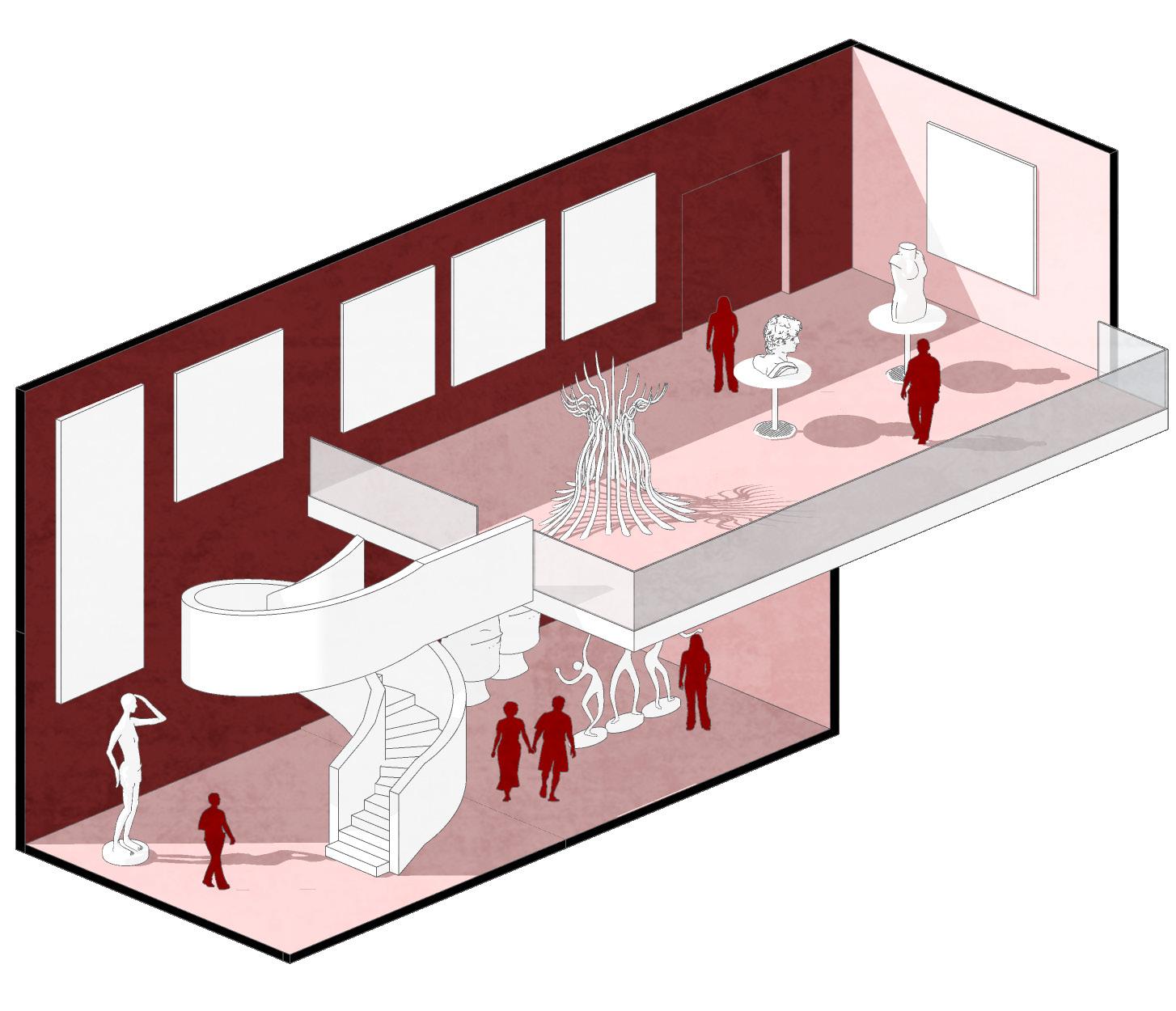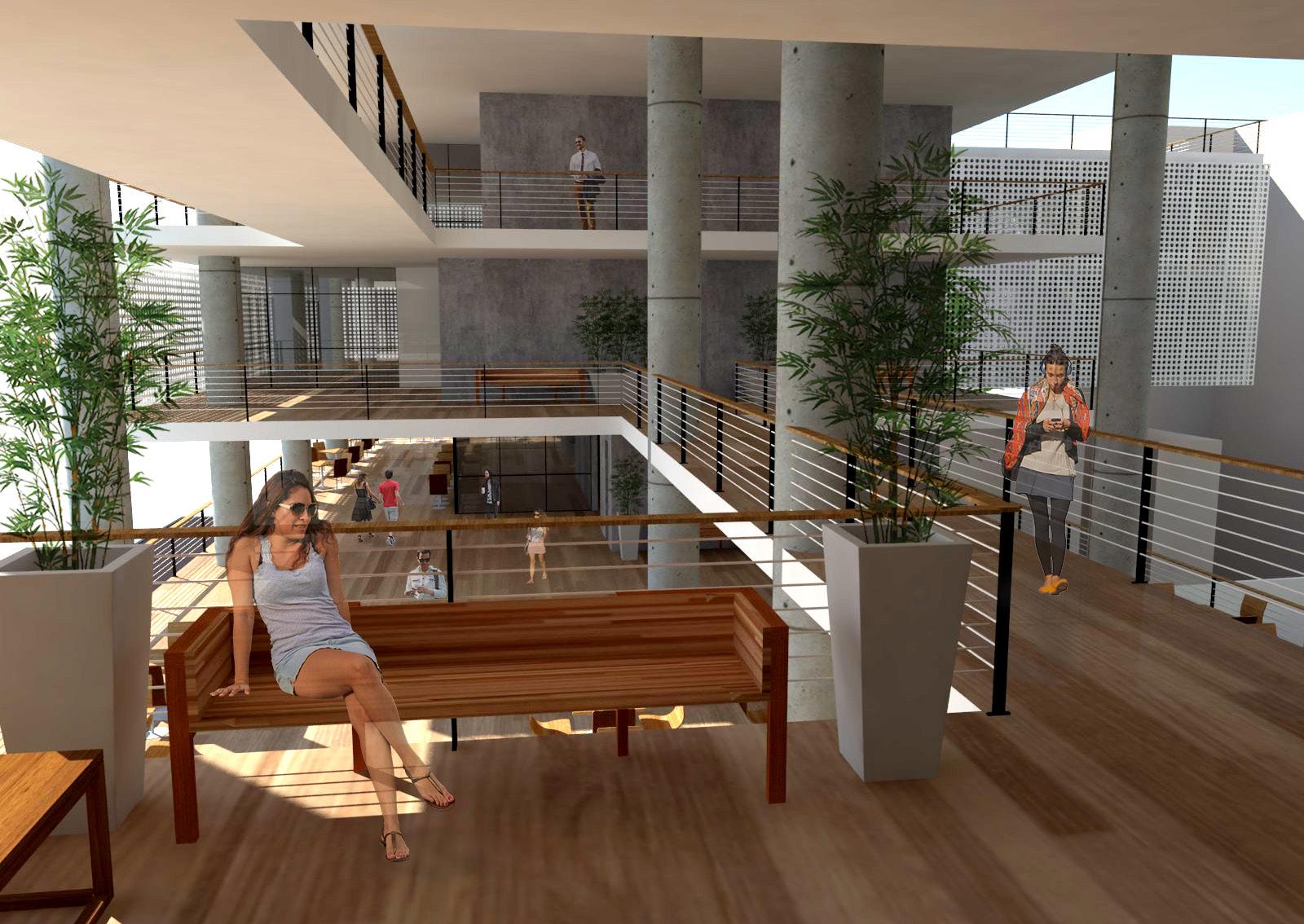

PORTFOLIO
JULIANNA BARRETO

I am a young architect passionate about the impact of design on human behavior. I believe that cities, like living beings, have immense potential for development when equipped with the right tools. Architecture plays a vital role in this process, and it should be adaptable and accessible to all, keeping up with the changes of our contemporary world. By embracing necessary changes, architecture can contribute to the city’s growth and fulfill its purpose effectively.
2024 - present 2021
2013-2019 2017
2008-2011
Education
CALIFORNIA COLLEGE OF THE ARTS
Master of Architecture| GPA: 3.8 (4.0 scale)
BRAZILIAN INSTITUTE OF EVALUATION AND ENGINEERING SKILLS OF ESPÍRITO SANTO
Certificate in Advanced Real State Evaluation
FEDERAL UNIVERSITY OF RIO DE JANEIRO
Bachelor of Architecture and Urbanism | GPA: 3.0 (4.0 scale)
BUENOS AIRES UNIVERSITY
International Exchange Workshop
FEDERAL CENTER FOR TECHNOLOGICAL EDUCATION CELSO SUCKOW DA FONSECA
Certificate in Building Techniques
Work Experience
2024 - present
GRADUATE STUDENT ASSISTANT
Supervisory training for the Laser Cutting machine and 3D Printers
Assist with the day-to-day management of the Laboratory
Supervise and maintain machinery and oversee studio monitors
2020-2024
ARCHITECT FOUNDER
ODE Arquitetura
Project Management
Building design development
Graphic representation (drawings and 3D modeling)
Construction monitoring
ARCHITECTURE DESIGNER
2019-2021
State Public Prosecution Office of Rio de Janeiro
Collaboration of the renovation projects (design and representation)
Preparation of construction documents
Inspection of state buildings
ARCHITECTURE INTERNSHIPS
2019-2021 2016-2017 2012
Boulevard Mall
JB Engineering
Rio de Janeiro Municipal Urbanization Company
Skills
Autocad
Sketchup and Vray
Photoshop, Illustrator and InDesign
Revit
Model Making
Contact
+1 (925) 502-9220
juliannaqmello@gmail.com
San Francisco - CA

page 5

page 11

page 17
I. Open Building
II. Paraju House
III. Hiatus Complex



page 25 page 32
Projetar Pavillion
V. The Haven

Open Building
Year: 2019
Location: Rio de Janeiro
Tyle: Undergraduate Thesis
What is the boundary between defining spaces in architecture and the potential for their uses?
This project seeks to question the conventional definitions in architecture, where spaces are determined by their uses, and aesthetics follow a common sense dictated by the author, resulting in a typical building.
Therefore, a multiprogrammatic, generic building is proposed, allowing freedom of options within what can be mutable. This aims to respond to the pressure of time, which increasingly demands our adaptability to transformations.







The elements composing this building have been categorized as “fixed” and “movable”.
FIXED
The structure, vertical circulation, ventilation prism, and parking, essentially everything that is difficult to change (even in today’s context).
MOVABLE
The movable elements, on the other hand, are the modifiable components that provide design freedom within the project itself. These include enclosures, installations, surfaces, finishes, and facade.
This arrangement creates a building open to possible modifications and capable of embracing multiple identities.

SIMULATION #1





1. EXAMPLE OF A RESIDENTIAL PROGRAM
2. EXAMPLE OF A COMMERCIAL PROGRAM
3. EXAMPLE OF A CULTURAL PROGRAM

Paraju House
Year: 2021
Location: Rio de Janeiro
Tyle: Architectual Design
Role: Design concept, Model making, Rendering Co-authors: Leandro Sacilotto, Sarah Carnielli
The concept of the project was founded on the wish to conceive a house that could be used both as a secluded rural retreat, as well as a place for the chef to create conceptual plates and offer dinner events for small parties.
As such, two separate blocks were designed according to these functions: a private quarter to serve as a residence, and a social quarter to serve as a restaurant.
Despite the need to separate the terrain into independent volumes, there was a desire to create a visual affinity that unified the two blocks into a single entity, which was implemented through a pergola and a garden connecting the spaces.


RESIDENCE RESTAURANT

1. SEPARATE BLOCKS
Two blocks are created to separate the private and the public quarters
2. DYNAMICS
The roofs incline to opposite directions to create character while comunicating aesthetically
3. LINK
CONEXTION
4. OUTCOME

A pergola is created to connect both volumes and acts as a transitional space
The result is an harmonic design that integrates the two programs





1st Floor









Hiatus Complex
Year: 2017
Location: Rio de Janeiro
Tyle: Undergraduate
The Hiatus Building was designed to meet the needs of audiences and become a multifal environment that serves as cultural hub and a center of in the Largo doado neighborhood. Its location enhances use of the commercial building which offers offices and coworking. In addition, a gastronomic complex, a gym and accessible retail.
Adjacent to it, a residential building with four apartments per floor and, in the first floors, restaurants and bars. The two buildings delimit a central plaza, which functions as a connecting element and a leisure area for those who wish to enjoy the various proposed activities.



1º MOVEMENT
To align the foundation with the construction of the block.


2º MOVEMENT
The overlapping of different blocks configures dynamic spaces.


3º MOVEMENT
Two solid blocks are added to complete the composition. COMPLETE
The voids generated encourage interaction between the buildings


NORTH FACADE

ribbed concrete slab
horizontal metal sunshades, 250 x 50mm
white aluminum frame
metal drip edge
horizontal metal sunshades, 250 x 50mm
upright welded and screwed onto the slab
white aluminum frame perforated metal panel
metal beam


WEST FACADE : FRONT
WEST FACADE : BACK













Internal path with the gastronomic complex
View from the mezzanine on the fourth floor
Internal courtyard with shops on the ground floor


Projetar Pavillion
Year: 2017
Location: Rio de Janeiro
Tyle: Contest
Role: Design concept, Model making, Rendering
Co-authors: Leandro Sacilotto, Matheus Lima
The Projetar Pavilion arises with the proposal of serving as a physical and intellectual extension for the academic environment of the School of Architecture and Urbanism of the Federal University of Rio de Janeiro, in addition to the challenge of presenting itself as an architecturally interesting and inspiring space.
The idea is to continue to dialogue with the Jorge Machado Moreira Building - a neighboring structure, built under the lines of the modernist movement with imposing volumetry on the land where it is inserted - and not to interfere with the perception of the region.
The purpose of the pavilion is to provide a welcoming space that inspires creativity and stimulates the exchange of knowledge.




EXHIBITION AREA
Circulation and connection between the other areas, made up of the same partitions as the studio area, which can also serve as exhibition panels.
ARTICULATED FRAMES
Articulated frames The Design Pavilion features metal frames on its facades measuring 1.00m x 3.30m, which can be articulated to modify their use: they can transform into a deck that crosses the reflecting pool, intersecting with the architectural object, and can also extend to function as sun protection.
DISCUSSION AREA
It features an "L" shaped fixed seating area and is located on a lower level than the rest of the areas.

Bamboo the main material because resilient, the building connection nature on
BAMBOO
BAMBOO FENCES
METAL STRUCTURE
Structure easy to assemble and replicate due to its capacity to be prefabricated.

STRETCHED PARTITIONS
The internal partitions, 0.70m x 3.00m panels, are formed by stretched cords that serve as a physical barrier and are arranged in sequence, along a sinuous profile, configuring the internal spaces of the pavilion.

has been chosen as material for the fences it is lightweight and as well as providing building with a symbolic connection to the abundant campus.
WORKSHOPS
A central space configured by a sequence of extended partitions, with furniture geared towards academic production.
FOYER
It functions as a space for sociabWility and relaxation.


STRUCTURAL DIAGRAM LEGEND:
1. Polypropylene tile
2. Metal structural profiles for roofing
3. Coating for bamboo ceiling
4. Metal structure in portal and trusses
5. Bamboo sealing
6. Structural profiles with rails for panel fixation
7. Metal panels with hinges
8. Bamboo panel coating
A Continuous and Fluid Space
The primary entrance of the pavilion faces the SAU, welcoming visitors. The large facades feature windows that manipulate interior lighting, offering glimpses of the outside environment and changing the overall ambiance.
The pavilion is organized in a linear progression from the entrance. It starts with a welcoming foyer, leading to studio and exhibition areas, and ending in the discussion space.
The location of the pavilion was carefully chosen, considering the movement patterns within the JMM Building. Its visibility and vitality were emphasized by its proximity to the intersection of the building’s main access points.
Through its design and location, the pavilion aims to create an inviting space that fosters creativity and collaboration.





The Haven
Year: 2024
Location: Oakland
Tyle: Graduate
The Oakland Library’s primary goal is to embrace and revitalize neighborhood activities, serving as a hub that empowers and connects the community.
Given the city’s history of art production and norm disruption, the program focuses on the local artistic community, including aspiring artists and students, while also providing space for the wider community to host meetings and events.
Its landscaping is directly related to the surrounding block, which features programs with potential for integration, as well as the plaza in front.
The Library will be a focal point that revitalizes the urban context of the area.



GROUND FLOOR







Julianna Barreto


